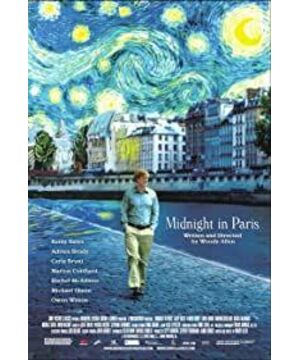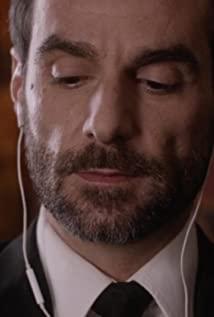Spoiler alert: By chance, Jill returned to Paris in the 1920s in a classic car in Paris at midnight, chatting and laughing with Hemingway, Picasso, Fitzgerald, Dali, and other great writers and artists who had jumped in their thinking. Later he met Adriana, the flesh and blood of the art world, and fell in love. Adriana, like Jill, is also an unrealistic idealist. She believes that the "Belle Epoque" (from the end of the nineteenth century to before the First World War) is the perfect and most sensitive and passionate. By chance again, Adriana and Jill rode a carriage to the Maxim's Bar in the 1890s at midnight. There, they heard Gauguin and Degas complain about why people in this era are poor and lack imagination. This era is empty and without imagination. So they lamented that the Renaissance was the most desired age. When the film progressed to this point, the plot reached a climax. Jill woke up instantly. In the state of muttering to himself, the film’s "anti-traveling" theme was revealed (many people who did not understand this film regarded this film as a mere literary film, and they struggled to write down the names of the writers who appeared in the film. Make up lessons to improve one's sentiment, of course, in the end, it's nothing to stop), and also tells the truth:
There are no antibiotics, no anesthetics at the dentist. When you want to stay here, then this becomes your present. Then before long, you will begin to imagine another era, which is your "golden age". So what is reality? There are many unsatisfactory things now, but life is made up of unsatisfactory. If I want to create something truly meaningful, then I must eradicate my hallucinations. Therefore, thinking that living in the past will be happier may be one of those hallucinations-this is the "rejection mechanism", denying the defense consciousness of reality.
What they (nostalgics of the times) do not realize is that each era has its own filth. In various films and televisions, we only see the beautiful side (often caused by artistic modification, seizing certain shining points to make a big deal). The article caters to the tastes of literary and artistic youth) but ignores the gloom behind it. Can not see the fact that the era is generally in a progressive state, so someone blindly plunged into the ancient traditional culture to find comfort, so the "Confucian constitutional government" (discussed in detail later) supporters were born. The "Golden Age" is nothing more than the product of the romantic dreamer. Even if I put aside the "escape from emotions", I would not choose to go back to any era in the past-the low standard of living (information, material, medical care) alone is enough to make people unbearable:
Nowadays, some people think that the past life is better. They say that not only the simplicity, tranquility, spirituality, and interpersonal communication in the past life are all gone, but even the human morality is no longer in the past. Please note that this kind of rosy nostalgia is generally limited to wealthy people. Anyway, you don’t have to use a squat toilet, how easy it is to sing an elegy to the lives of farmers. Imagine somewhere in Western Europe or Eastern North America in the 19th century, in a simple wooden house, a family sitting around a fireplace. Father read the "Bible" aloud, and mother prepared beef stew with onion for everyone. The second sister takes care of the younger brother, the eldest son scoops water from the earthen jar and pours it into everyone's cup on the table, and the elder sister feeds the horses in the stable. There is no noise from cars, no drug dealers in the outside world, and there is absolutely no dioxin or radioactive fall in the milk. Everything is so quiet and serene, and the birds and flowers outside the window are fragrant. Please, come less. Although this is the best family in the village, the father who is reading the scriptures still coughs vigorously because of the smoke from the firewood. If he keeps coughing like this, he will suffer from bronchitis sooner or later, and he will die at the age of 53. (He is lucky. In 1800, even in England, the life expectancy was less than 40 years old.) The baby kept crying because he had smallpox and would die soon. His second sister will soon marry an alcoholic husband and become that person's slave. The water poured by the eldest son smelled like cows, because the cows fetched water in the same stream as people. Toothache tormented mother. In the stable, the neighbor’s tenant made the eldest sister pregnant, and when she was born, the child would be sent to the orphanage. Beef stew is tasteless and difficult to chew, but apart from beef, the usual meals are only gruel, because this season there is no fruit or salad. People eat from wooden bowls with wooden spoons. Candles are too expensive, you can only look at things by the fire. No one in the family has ever seen a play, drew a picture, or listened to a piano performance. The so-called school education is to let paranoid suburban pastors teach boring Latin for a few years. My father had visited the city once, but the trip cost him a week’s salary, and the others had never been more than 15 miles away from home. The daughters each have two woolen skirts, two linen shirts and a pair of shoes. Father's coat cost him a month's wages, but now it is full of lice. The floor is covered with straw mats as beds, and the children sleep together. As for the bird outside the window, it will be caught by the boy tomorrow and eaten in the stomach. (Matt Ridley "Rational Optimist")
In fact, the dialogue of Paul, who was mocked by Jill as a pseudo-intellectual at the beginning of the film (called him "Mr. Bookbag"), reflects the center of the film: nostalgia is rejection, rejection of painful reality. The daydreamer will be happy to live in a constant state of rejection. There is a saying for this state, which is called the "golden age complex." This is a misconception that a person lives in another period is better than the one he is now in. This is fabricated by those who are full of romantic imagination, and they find it difficult to cope with reality.
Our time is the "golden age".
View more about Midnight in Paris reviews











